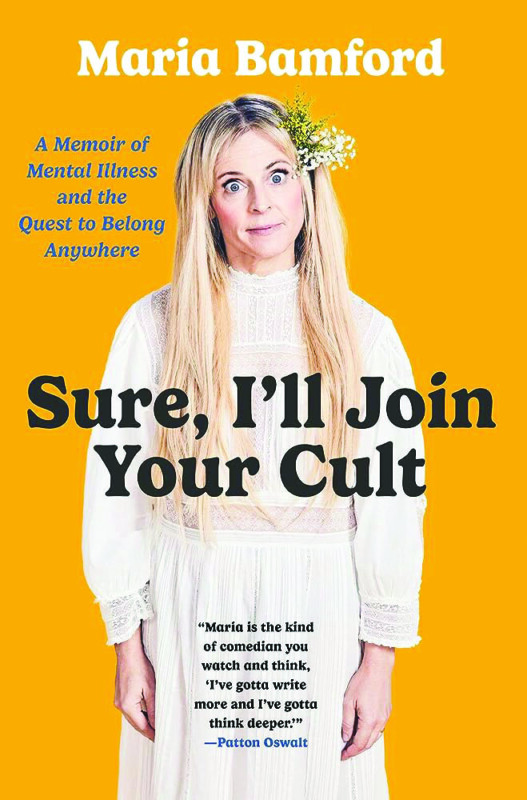Sure, I’ll Join Your Cult, by Maria Bamford (Gallery, 272 pages)
Are comedians prone to mental health problems? Two new books add to this image of the troubled funny man (or woman) — Misfit by Gary Gulman (Flatiron, 283 pages) talks about the comedian’s struggle with anxiety and depression; he also had an HBO special in 2019 called “The Great Depresh” that’s about mental illness.
Then there’s Sure, I’ll Join Your Cult by Maria Bamford, which is subtitled “A memoir of mental illness and the quest to belong anywhere.”
I haven’t gotten deep into Gulman’s memoir, but here’s what I can tell you about Bamford’s: It’s kind of a hot mess, a rambling, often cringey discourse that only occasionally does justice to its underlying and interesting premise: how secular “cults” — from family to 12-step groups — entice us because of our pathological need to belong.
To be fair, the need to belong is a feature, not a bug in our species, one that helped protect our ancestors from predators and starvation — safety in numbers, and all that. Groups provide human beings cover and, often, meaning. And Bamford has joined plenty, including Debtors Anonymous, Overeaters Anonymous and Sex and Love Addicts Anonymous. Her experiences in these groups provide a loose scaffolding for Bamford’s stories and jokes.
She wound up at Debtors Anonymous, for example, after an STD led to an infection which led to $5,000 in medical bills she couldn’t pay because she was working for a bakery, loading trucks. The work, she said, wasn’t enough to cover rent and groceries, let alone medical debt, and collectors started calling, and then she got robbed. Her parents were well off but announced they would support her emotionally but not financially, and apparently the emotional support wasn’t so great either.
So at Debtors Anonymous, Bamford got solid advice on how to deal with creditors and put her financial house in order, and got support from fellow sufferers. “This is the great thing about twelve-step support groups. You can share the grossest elements of your personal failings and all you will hear is peals of joyous recognition to the rafters of whatever Zoom breakout room you’re in,” she writes.
After a year of sundry humiliations, including living in someone’s spare bedroom and taking every temp job she was offered, Bamford was hired full-time at an animation studio in L.A. There she could afford an efficiency apartment with a pool (“Filled with leaves and a dead baby possum, but a POOL!”) It took eight years to fully pay off her medical debt, while she was cobbling together a career in which she was successful on some fronts and still struggling on others. For example, she was fired from a job at Nickelodeon shortly before she got work doing voice-overs for the series CatDog. She was still working reception jobs by day when she was appearing on the Tonight show.
Along the way she was struggling to have sustained relationships, which is one way of saying she was having a lot of one-night stands. “What to do? I joined another twelve-step group! Sex and Love Addicts Anonymous.”
There, she met “buzzy, intense people in tight clothes” who supported each other in coming up with a “dating plan” and she eventually improved so much that she was able to have a relationship for 11 months with someone who was in a group called Marijuana Anonymous.
At this point, Bamford starts running out of 12-step groups to write about, so she ascribes culthood to other random things, such as success. One success she found was as an actor in Target Christmas commercials (you can see them by Googling “Target Christmas Lady”) starting in 2008. But the success of those commercials constrained her in other ways, and she had a personal tragedy involving a dog she loved, and then because Bamford had started feeling ethically compromised by working for Target, she wrote a letter to “The Ethicist” column at the New York Times, setting off a chain of events that got her fired.
I am literally exhausted by this point, just reading about her life.
She foresaw this, writing “Maria, where was your psychiatrist in all this?” and explaining that she’s been on Prozac for an eating disorder since 1990, and now she was thinking she could be bipolar, and then she had a terrible relationship with a bad man, and suddenly she’s checking herself in a psychiatric ward — at which point she is entering a new cult, “the cult of mental health care.”
The book ends with what is officially called “Obligatory suicide disclaimer” and a genuinely heartbreaking sketch that Bamford did in fifth grade. It’s titled “I feel down in the dumps” and shows a child kneeling with their head hung down. It makes evident that Bamford’s difficulties with mental health aren’t simply the result of bad decisions in adulthood, and a difficult mother, but mental demons have stalked her since childhood. She writes, “Like most people, I’ve thought of suicide between eight and ninety times per day since around the age of nine,” even though she says, “Even regarding suicide, I’m not a can-do person.”
Finally Bamford goes into a couple of pages of jovial advice for people who are suicidal. Call a helpline — dial 988, for starters. “BUT IF THAT FAILS: Call AT&T! Call Domino’s. Call an anti-abortion ‘clinic’! See if they’re pro-life for your life.”
OK, this is comedy, I get it. (I think. Does she really think that “most people” think of suicide all day every day?) And there will no doubt be people struggling with mental health for whom this approach is genuinely helpful. “Please don’t hurt yourself or anyone else. Do something else instead. Even if it’s harmful! Suicide is a one-off. You can do meth at least twice without consequences! … Knock yourself out with a forty-ounce keg of Baileys Irish Cream and a Dairy Queen Blizzard. You do not want to miss any additions to the Dairy Queen product line!
Bamford is genuinely funny, and there are moments of light and love in this book, however fleeting. There’s a lot of family angst between Bamfords that remains unresolved, let’s just say.
But there is still something unsettling about turning mental health struggles into a punch line as Bamford and other comedians are doing, apparently successfully. If this book helps even one person, then it’s an unqualified success. But for someone who doesn’t think about suicide at all, let alone regularly, it was an uneven and heart-rending read. C
— Jennifer Graham
Featured photo: Sure, I’ll Join Your Cult, by Maria Bamford. Courtesy photo.






